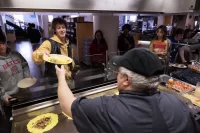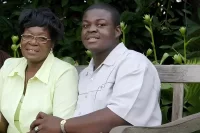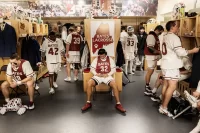
2006 Martin Luther King Day Workshops
The following workshops will be held in Pettengill Hall, Monday, Jan. 16:
Session One, 1:15 to 2:15 p.m.
1. “The Spiritual Roots of Dr. Martin Luther King, Jr. and Their Legacy Today”
Pettengill G65
This workshop will highlight the spiritual resources that enabled Dr. King to work for justice in a spirit of love throughout his career despite strong and violent opposition. Recorded speeches and sermons by Dr. King ranging from his days in Montgomery up to his last speech in Memphis will provide the source materials for our conversation.
Convened by: The Reverends William Cutler and Tim Clayton
Adviser, Bates Christian Fellowship
Bates Associated Protestant Chaplain
2. “African American Music and Utopia”
Pettengill G52
African American music has a powerful relationship with time that has had an immense impact on how the American body politic has imagined itself. Julian “Cannonball” Adderly captures this sense of an investment in the immediacy of time and place with his song title “This here” — the title evokes the way in which African American music practices — ranging from jazz and blues to R&B and Hip Hop – envision social
utopias in the immediacy of the moment. This panel will provide a forum for discussing the social possibilities inherent in African-American music, and their means of evoking community in the moment.
Convened by Dale Chapman, Music Department, and
Eric Obeng ’07 and Amadi Cisse ‘07
3. “How Governments Fail Their ‘Own’
Pettengill G21
A discussion of how the intertwining of various governments, large and small, have the effect of paralyzing the local societies in terms of planning, resource development, debt, and political attachments, and agreements which do not serve the populace. Using Caribbean nations and U.S. cities as backdrops, examples that lead to stalemate will be reviewed.
Convened by: Amandla!
4. “A Dress Code: Racism or Professionalism”
Pettengill G50
This workshop addresses the issue of cultural images in professional sports and how values as an expression of culture and power as a manifestation of politics in the arena of sports.
Convened by: Professor McClendon’s Cultural Politics Class in AAACS, Josh Goldfarb ’09, David Lloyd ’09, Mike Henry ’08, and Chris Ward ‘09
5. “Peace Speaks in Many Voices: Poetry of Justice from Around the World”
Pettengill G10
During this workshop, we will invite those in attendance to share poems in different languages which address the themes of peace and justice for this year’s MLK day. We will advertise the event in advance, and attempt to get students from different language classes to participate — reading a short poem in another language, and then in English translation.
Convened by: Professor Jane Costlow, German, Russian, & East Asian Languages and Literatures
6. “Philosopher King: The Influence of Hegel on King’s Political Thought and Practice”
Pettengill G54
The central focus of this paper is the neglected topic of King as a dialectician, that is, his comprehension and employment of dialectics. When we examine King’s political and ideological development dialectically, we see that there are stages in the development of his thought. During his early foray into the African American liberation movement from 1955-1964, King’s liberal democratic framework and thought that reaching reconciliation, finding a middle ground, was indicative of how dialectics should be applied to the tactics and strategy of the movement. Consequently, the material context of the African American liberation movement served as a dynamic process which greatly affected King’s cognitive grasp of dialectics as a tool of analysis.
Convened by: Dr. Stephen Ferguson, Assistant Professor of University Studies, University of North Carolina, A&T
Session II, 2:35 p.m. – 3:30 p.m.
7. “Keine Gewalt! No Violence! How Peaceful Street Demonstrators Brought Down a Police State: East Germany Revisited”
Pettengill G65
This workshop intends to cover these instances of civil disobedience, courage and peaceful confrontation in the face of the threat of massive repression and military force on the part of the state. This confrontation was so effective, and ultimately prevailed, because it was informed by a deep moral indignation, a determination to transform existing structures and circumstances, and a deeply felt commitment to the principles of non-violence. This is a story that those happy images of dancing on the Berlin Wall do not tell. It is one chapter in the global struggle for civil rights and human dignity.
Convened by: Professor Denis Sweet, Department of German, Russian & East Asian Languages & Literatures
8. “Prisons: Serving or Undermining Justice?”
Pettengill G52
Who gets imprisoned and whose end does imprisonment serve? This workshop invites participants to reconsider common notions that prisons perform, or even have the potential to perform, important and worthwhile tasks in the administration of justice. To frame the discussion, we consider some current U.S. policies, practices, ideologies, and institutions of imprisonment. With attention to dimensions of race, gender, religion, ethnicity, nationality, economics, and sexuality, and inspired by the work of activists such as Angela Davis, this workshop asks people to go beyond ideas of prison reform and consider whether prisons should even exist.
Convened by: Professors Sue Houchins and Melinda Plastas, Women and Gender Studies, and Shaheen Nazerali ‘06
9. “Poetry as Resistance”
Pettengill G10
In communities of color, art is often used to express emotions of frustration and passion. Written and spoken word poetry, as a form of resilience, has been a catalyst for agency when our tongues become untied. How can we unite to create poetry that will combat racism, sexism, classism and homophobia? Poetry allows for the issues facing our communities to surface and become real to all, as they are for few. Come to Women of Color’s workshop on freelance writing that confronts themes of “War,” “Panic,” and “Stained.”
Covened by: Nakeisha Gumbs ’07, Leeanne Cunningham ‘08
10. “In a Democracy, Some are Guilty, but all are Responsible: King, Heschel, and the Role of Faith in a Democratic System”
Pettengill G63
This presentation will explore the relationship between Reverend King and Rabbi Heschel and their shared quest for justice and peace. It will also compare and contrast Heschel’s conception of justice in a democracy, referenced by the phrase comprising the session’s title, with that of Dr. King. It will then engage participants in a discussion about who is responsible for justice in our communities, nation, and world.
Convened by: Rabbi Hillel Katzir,
Spiritual Leader of Temple Shalom, Auburn
Bates Associated Jewish Chaplain
11. “Diversity in the Sciences: Report from a Symposium”
Pettengill G21
This session is designed particularly for faculty, although all are welcome. The four presenters attended the “Diversity in the Sciences Symposium” at Harvard in November 2005. They report here on the findings of the symposium, focusing on especially on the reasons educators should be concerned that students from all backgrounds study science and on the programs at other institutions which have been successful at attracting and retaining students from underrepresented minorities to the study of science.
Convened by: Shawna-Kaye Lester ’07; Professor of History Elizabeth Tobin, Special Assistant to the President; Tom Wenzel, Charles A. Dana Professor of Chemistry
12. “Is Peace Possible? Lewiston SEEDS OF Peace Point the Way”
Pettingill G54
Seeds of Peace is an international organization dedicated to empowering young leaders from regions of conflict with the leadership skills required to advance reconciliation and coexistence. Beginning with 46 Israeli, Palestinian and Egyptian teenagers in 1993, the organization still focuses on the Middle East but has expanded its programming to include young leaders from South Asia, Cyprus, and the Balkans. Its leadership network now encompasses over 2,500 young people from four conflict regions. In this session, Lewiston area Seeds of Peace participants will discuss their experiences in the program and the changes in their own lives and communities that have resulted. The teenagers will share how their approaches to conflict were challenged, how they learned to negotiate differences encountered between themselves and other participants, and how their worldviews were impacted through Seeds of Peace participation.
Convened by: Lewiston SEEDS of Peace
Session III, 3:35 p.m.– 4:30 p.m.
13. “Indigenizing the Struggle: Indigenous Leaders and their Contributions to Community Development and Political Leadership”
Pettengill G54
This workshop focuses on Indigenous leaders and their stories of leadership. Brining light to the struggles, past and present, that indigenous people face in North America. There will be a power point presentation and discussion will be open to attendees. The Indigenous Students Network is a student led organization that promotes the diversity of Indigenous Peoples’ cultures and histories.
Convened by: Student Cynthia Freeman ’06, Leeanne Cunningham ’08, Loreal Scott ’08, Claudeny Obas ’08, Diné Nation/Hopi Nation
14. “Is Paris Burning? Racial Clichés and Clashes in Clichy-sous-Bois”
Pettengill G21
In this session, several students and faculty in French will present and analyze the riots and violence that have occurred in the French suburbs in October and November after two teenagers died in Clichy-sous-Bois. After a general overview and some historical background information, we will discuss the use of racial and cultural stereotypes by the media in their accounts of this violence and by the French government in its assessment of the origin of such social unrest.
Convened by: Professors Laura Balladur, Alex Dauge-Roth, Mary Rice-DeFosse and students Mario Fumaroli, Nick Foster, Samantha Coran, Kelly Griffin, Margot Sakoian, Priya Brandes, Krista Stafstrom, Anna Levy, and Emily Friedman, Department of Romance Languages and Literatures
15. “Jazz Milestones on the Road to Civil Rights”
Pettengill G65
Certain jazz performers and landmark performances have either reflected the struggles and aspirations of African Americans or helped to shine a light down the path to freedom. We’ll listen to some of these famous recordings from artists such as Louis Armstrong, Billie Holiday, Duke Ellington, Charles Mingus, and others. Each piece will be examined for its social significance and put into its historical context; often the words of the musicians themselves will be brought to bear as well.
Convened by: Tom Hayward, humanities reference librarian and lecturer, Department of Classical and Medieval Studies
16. “Recent shifts in Lewiston’s Refugee Population”
Pettengill G50
This is a panel on the recent arrival in Lewiston of Somalia’s southern farmers. What happens in such a transnational context, given the former social dynamic between Somalia’s dominant class and its outcastes?
Convened by: Professor Elizabeth Eames, chair, Department of Anthropology; Catherine Besteman, professor of anthropology, Colby College; Heather Lindkvist, Bates lecturer in anthroplogy; and several local Somali residents.
17. “Brainstorming for a Summer Bridge Program in the Sciences”
Pettengill G10
This session is designed especially for faculty interested in Bates’ summer bridge program, although all are welcome. Summer bridge programs at other institutions have supported students from underrepresented minorities in their goal of becoming scientists. Our Hughes grant contains funding for a summer bridge program to begin in the summer of 2007. This session is a discussion among interested faculty and an opportunity to brainstorm ideas for this program.
18. “Beyond Policy Pathology: Toward an Oppression-Centric Model”
Pettengill G52 – (3:30pm-5:30pm)
Dr. Jones will address the question of racism from a systematic and structural analysis. He has conducted workshops on an international scale to help various groups to understand the power relations with respect to race. This workshop is a must for those who are committed to fundamental and radical transformation of white supremacy and racism.
Convened by: Dr. William R. Jones, Professor Emeritus in African American Studies, Florida State University
19. “Following the Androscoggin: Justice for a River and All Her Communities”
Pettengill G63
The Androscoggin River, birthplace of the Clean Water Act, has yet to meet even the lowest standards of that legislation. While other Maine rivers are being cleaned up, the Androscoggin remains the state’s dirtiest major river, and one of the most polluted in the nation. In the past year and a half, a huge, public battle has been waged about the future of the river – how clean should it be, and at what cost? Who “owns” the river? What is the river’s role in the communities that stretch along its length? Join Maine Rivers Executive Director Naomi Schalit and Androscoggin River Alliance Founding Member Neil Ward for a discussion of the controversy, and a guide to activism on the river.
Convened by: Naomi Schalit, executive director, Maine Rivers, and Neil Ward, founding member, Androscoggin River Alliance




